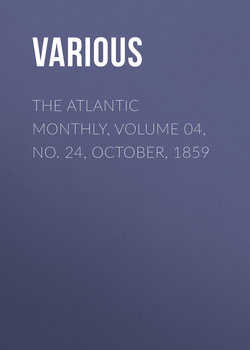The Atlantic Monthly, Volume 04, No. 24, October, 1859

Реклама. ООО «ЛитРес», ИНН: 7719571260.
Оглавление
Various. The Atlantic Monthly, Volume 04, No. 24, October, 1859
DAILY BEAUTY
THE RUDIMENTS OF DRESS
THE ARTIST-PRISONER
THE MINISTER'S WOOING
"VIRGINIE DE FRONTIGNAC."
CHAPTER XXVI
CHAPTER XXVII
CHAPTER XXVIII
CHAPTER XXIX
OLD PAPERS
RIFLED GUNS.5
A TRIP TO CUBA
BLONDEL
THE WONDERSMITH
II
III
IV
V
VI
VII
ROBA DI ROMA
CHAPTER IV
LA MALANOTTE
THE PROFESSOR AT THE BREAKFAST-TABLE
UNDER THE VIOLETS
REVIEWS AND LITERARY NOTICES
RECENT AMERICAN PUBLICATIONS
Отрывок из книги
To dress the body is to put it into a right, proper, and becoming external condition. Comfort and decency are to be sought first in dress; next, fitness to the person and the condition of the wearer; last, beauty of form and color, and richness of material. But the last object is usually made the first, and thus all are perilled and often lost; for that which is not comfortable or decent or suitable cannot be completely beautiful. The two chief requisites of dress are easily attained. Only a sufficiency of suitable covering is necessary to them; and this varies according to climate and custom. The Hottentot has them both in his strip of cloth; the Esquimau, in his double case of skins over all except face and fingers;—the most elegant Parisian, the most prudish Shakeress, has no more.
The two principal objects of covering the body being so easily attainable, the others are immediately, almost simultaneously sought; and dress rises at the outset into one of those mixed arts which seek to combine the useful and the beautiful, and which thus hold a middle place between mechanic art and fine art. But of these mixed arts, dress is the lowest and the least important: the lowest, because perfection in it is most easily arrived at,—being within the reach of persons whose minds are uninformed and frivolous, whose souls are sensual and grovelling, and whose taste has little culture,—as in the case of many American, and more French women, who have had a brief experience of metropolitan life: the least important, because it has no intellectual or even emotional significance, and is thus without the slightest aesthetic purpose, having for its end (as an art) only the transient, sensuous gratification of an individual, or, at most, of the comparatively few persons by whom he may be seen in the course of not more than a single day; for every renovation of the dress is, in its kind, a new work of Art. As men emerge from the savage state and acquire mechanic skill, the distaff, the spindle, and the loom produce the earliest fruits of their advancement, and dress is the first decorative art in which they reach perfection. Indeed, it may be doubted whether the most beautiful articles of clothing, the most tasteful and comfortable costumes, have not been produced by people who are classed as barbarous, or, at best, as half-civilized. What fabrics surpass the shawls of India in tint or texture? What garment is more graceful or more serviceable than the Mexican poncho, or the Peruvian rebozo? What Frenchman is so comfortably or so beautifully dressed as a wealthy unsophisticated Turk? There seems to be an instinct about dress, which, joined to the diffusion of wealth and the reduced price of all textile fabrics, has caused it to be no longer any criterion of culture, social position, breeding, or even taste, except as regards itself.
.....
Tomes. There I'm with Grey,—and the poets, too, I think.
Mrs. Grey. What say you, Mr. Key?
.....